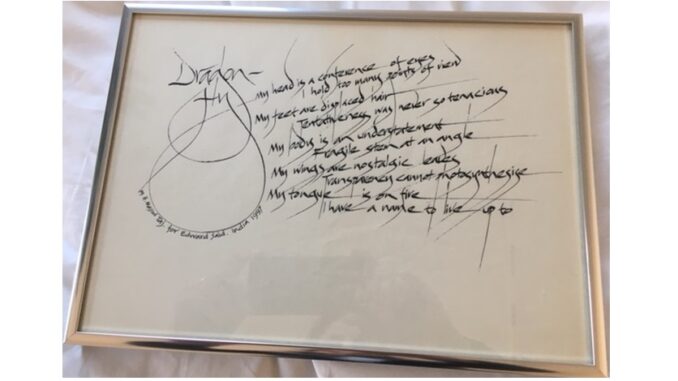
Photo by Mariam Said
H. Masud Taj
I
n 1997, Edward Said visited India to deliver the Rajiv Gandhi Memorial Lecture and receive honorary doctorates from JNU and Jamia Millia Islamia. His visit, it was rumoured, was classified under Z security, which meant that although everyone knew about his visit, no one knew his whereabouts. I spent the day on the phone. Calls to all the luxury hotels drew a blank, but finally, with a lot of help from friends, I found out where he was staying. His hostess, in an affluent neighbourhood of New Delhi, answered my call. I introduced myself as an oral poet and said that I would like to meet Edward Said.
Her voice barely concealed her surprise that a stranger could have traced Edward Said to her house but, amazingly, she came to the point, “What do you want to meet him about?”
I knew that everything depended on my reply. I had to convince her that this was not a prank call and that there was a compelling reason. So I told her the truth, “There is a poem of mine that I think Edward Said would like to hear. It is called Dragon Fly and while it is not dedicated to him, nevertheless I know he will relate to it nonetheless. But, being an oral poet, the only meaningful way that I can share the poem with him is to meet him in person and recite it to him. What I propose to do right now is to recite the poem to you. It will establish my credentials as a poet and will help you decide.”
This was all happening too fast. I guess to buy some time the good hostess said OK. So I recited it, as I do all my poems, from memory. I carry my poems in my head. The oral poet is poetry embodied. The phenomenon is as much biological as it is aural.
I recited Dragonfly hoping its wings would carry me to the portals of the house where Edward Said was staying.
My head
Is a conference of eyes;
I hold too many points of view.My feet
Are displaced hair;
Tentativeness was never so tenacious.My body
Is an understatement;
Fragile stem at an angle.My wings
Are nostalgic leaves;
Transparency cannot photosynthesize.
My tongue
Is on fire;
I have a name to live up to.
There was silence at the other end of the line. I, not knowing what to say next, remained silent. The good hostess spoke, “Can you come tomorrow evening at 6?”
![]()
That is how I met Edward Said one winter evening in India. The evening began with me reciting the poem and after two hours the evening ended with me giving a copy of the poem to him inscribed in my Itarabic calligraphy (a fusion of sharp Italic and cursive Arabic) while he presented me a copy of his foundational Orientalism.
Six years later I emailed him wondering if he recalled our meeting. His reply was prompt and reassuring, “nice to hear from you. Your dragon fly sits on the shelf in front of me” and added with his characteristic wit. “My tongue is certainly on fire” (he was then undergoing cancer treatment and died five months later).
That was one tenacious dragonfly!
![]()
*******
Taj, H. Masud "Dragonfly" Reasons for Belonging: Fourteen Contemporary Indian Poets, Ed. Ranjit Hoskote, Penguin Books 2002, p.49; Calligraphy exhibited in "Downloading Animals" Solo exhibition at Galerie Jean Cocteau. Bombay, April 6-10, 1999 and published in Atlas 02: New Writing, Art, Ed. Sudeep Sen, Aark Arts 2007
H. Masud Taj poet, calligrapher and architect grew up in Bombay, hearing Urdu poetry at dinnertime conversations. He is an award-winning Adjunct Professor at Azrieli School of Architecture & Urbanism and lectures on Muslim civilizations at the Centre for Initiatives in Education, Carleton University in Ottawa. He is the architect of War Memorial in Bombay, was mentored by Hassan Fathy in Egypt, worked with Charles Correa in India and conversed with Arthur Erickson at National Gallery of Canada. His book Embassy of Liminal Spaces synthesizing his poetry, calligraphy and architecture is a permanent installation at the Canadian Chancery, India and has been inducted into the Library of Parliament. His book on Frank Lloyd Wright’s apprentice Nari Gandhi is archived in the University’s Special Collections and his poetry collection Alphabestiary featured at the International Festival of Authors, Toronto. Taj himself featured in Portraits of Canadian Writers, on TIME, CBC and BBC. His writings on the website Academia can be freely accessed at https://carleton-ca.academia.edu/HMasudTaj
Masud Taj in The Beacon

This is a marvellous story. Masud’s poetry is wonderful. He paints such memorable pictures in just a few words. I had not known of Dragonfly earlier.